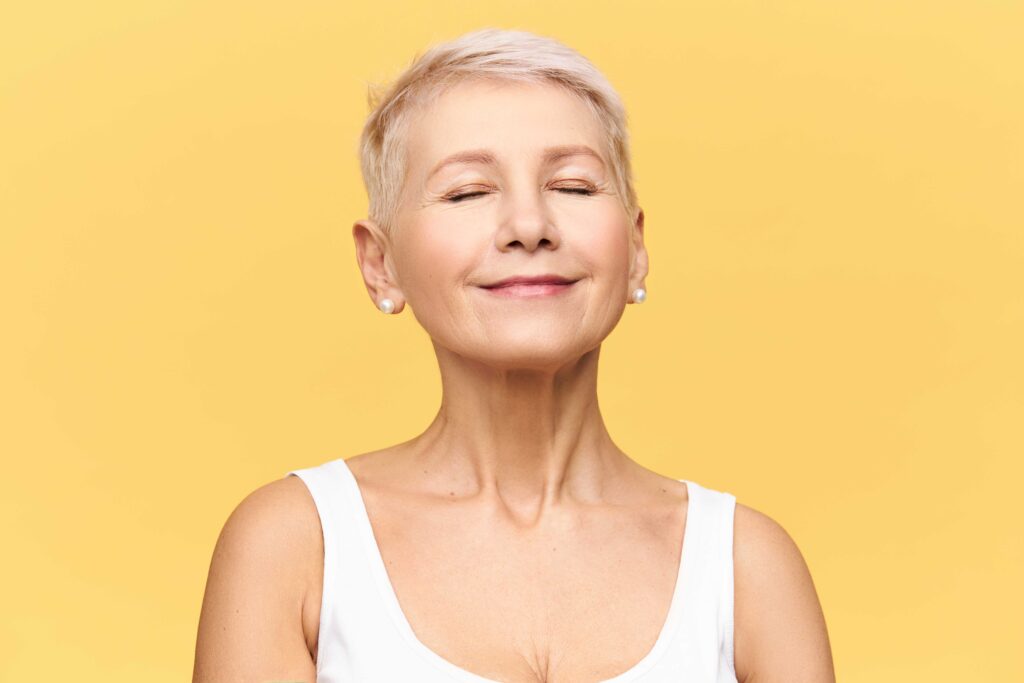Skin Health
Why Does Our Skin Age?
Getting older is a natural and beautiful process that everyone goes through. However, while there’s nothing wrong with getting older, it has some unwanted effects on our bodies. Among the many changes we go through as we age, our skin also goes through changes and seemingly ages with us. This can lead to unwanted wrinkles, sagging skin, and other obvious signs of aging that many people don’t want to deal with.

Why Exactly Does Our Skin Age?
For most people around the world, aging skin is an inevitable side effect of getting older. While some people’s skin shows signs of aging more than others, no one is exempt. Additionally, although there are anti-aging creams and treatments you can utilize, aging skin is natural and to be expected.
In addition to being a natural part of getting older, skin aging is also caused by external factors such as sunlight. UV radiation can make your skin saggy and wrinkly and lead to discoloration, among other things. Here’s a breakdown of the main reasons our skin ages as we do.
Lack of Cellular Regeneration
When we’re young, our skin goes through very quick cellular regeneration. Cellular regeneration is the process of creating new cells to replace old ones when they die. This is important because healthy, living cells help your skin remain young and firm. In young people, skin cells regenerate very quickly, leading to tight, smooth skin. As we get older, however, our cells don’t regenerate as quickly, which leads to saggy, dry, and wrinkled skin.
A slowdown in cellular regeneration is part of the skin aging process known as intrinsic aging. Intrinsic aging is perfectly natural and refers to changes happening within your body that you can’t avoid.
UV Radiation
As we said before, UV radiation plays a big factor in aging skin. UV radiation affects the cells in the top layer of your skin by causing a reaction where they release harmful dermal fibroblasts into the lower layers of the skin. In young people, rapid cellular regeneration hides these effects. In older people, however, UV radiation compounds intrinsic aging factors occurring within your body and makes your skin age faster than it would without sun exposure.
Loss of Collagen
Along with cells, collagen is one of the basic building blocks of the skin. As with skin cells, collagen is continually being broken down and re-created to make your skin as strong and tight as possible. However, as you get older, collagen regeneration is slower and doesn’t occur as readily. Additionally, UV radiation can further slow down collagen production, leading to saggy, loose skin.
Fat Tissue
No matter how in shape or fit you are, everyone has fat tissue stored beneath the surface of the skin. Unfortunately, this fat tissue inevitably begins shrinking with age, resulting in sagging skin. While you can’t prevent this from happening, new studies are showing that UV radiation can speed up the fat-shrinking process, leading to skin that ages faster than normal.
Other Extrinsic Aging Factors
While UV radiation is the most potent extrinsic skin aging factor, there are many other external things that can make your skin age more quickly than it should.
- Tobacco and smoking kill skin cells and slow regeneration.
- Alcohol dehydrates your skin and leads to premature aging.
- An unhealthy diet can lead to excessive skin aging.
Stress and not getting enough sleep can inhibit skin cell regeneration. - Certain types and brands of makeup are terrible for your skin and can lead to aging.
Signs That Your Skin is Aging
In addition to the simple fact that you’re getting older, here are some of the most common signs that your skin is aging. Knowing these signs can help you be on the lookout for aging skin so that you can take corrective measures.
- Sagging skin
- Wrinkles
- Discoloration
- Fine lines
- Droopy eyelids
- Excessive sagging under the arms
- Dry or dehydrated skin
Healthy Ways to Prevent Skin Aging
While aging skin is an inevitability, nobody wants to have saggy, droopy, dry skin. Although you won’t be able to hold off the effects of aging forever, there are certain things you can do to keep your skin looking young for as long as possible.
- Limit your time in the sun and always wear sunscreen.
- Ensure you’re getting enough fruits, vegetables, and essential vitamins into your system.
- Avoid unhealthy habits such as drinking heavily and using tobacco products.
- Use healthy skincare products made with natural ingredients that are good for your skin.
- Exercising will increase blood flow and help with skin regeneration.
- Consider healthy supplements containing important vitamins and minerals.
These are some of the best things you can do if you don’t want your skin to look as old as you are. However, it’s important to get your supplements and skin care products from a trusted supplier of healthy, natural supplements.
References
Skin Care and Aging | National Institute on Aging (nih.gov)
Why Does Your Skin Age? – Dartmouth Undergraduate Journal of Science
Why does our skin age? (medicalnewstoday.com)
Like? Share with your friends
Learn More Information on How Toki Can Improve the Appearance of Fine Lines and Wrinkles*

